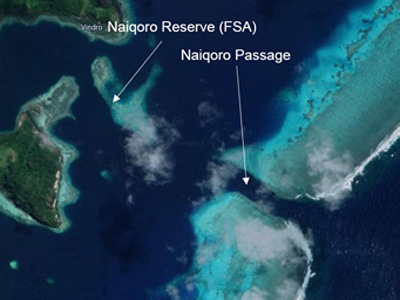The United Nations’ (UN) Sustainable Development Goal 14 – Life below water – aims at conserving and sustainably using the oceans, which represent 70% of the Earth’s surface.
This goal is connected to the global target to expand protected areas to 30% of the planet by 2030, focusing on areas that are particularly important for biodiversity, such as coral reefs, on which people living in coastal areas depend to survive. This is particularly the case for New Caledonia and Fiji – two archipelagos that are located in the Pacific Ocean – where most of the population lives in coastal areas and relies on some of the largest barrier reefs in the world. Pacific Island countries and territories – in particular their Indigenous peoples who see themselves as the custodians of the ocean for the general good, their sovereign rights, and their holistic knowledge – are increasingly recognized as integral for achieving such ambitious conservation objectives.
The reef passages connecting coastal waters and the open ocean are known as outstanding hotspots of biodiversity and productivity. Hence, they are of multifaceted significance for the overall health of coral reef ecosystems. SOCPacific2R explores these social-ecological ‘keystone places’ and ‘communication zones’ that have hardly been investigated by natural and social sciences. Through its empirical focus on New Caledonia and Fiji, and based on a trusted and interdisciplinary French-German-Pacific partnership, the project aims at:
- Conducting a transdisciplinary study of reef passages as under-researched features of social-ecological coral reef systems that constitute complex, interconnected, and dynamic assemblages of living and non-living, dwelling and transiting, entities that interact with each other;
- Documenting both area-based and other management and conservation arrangements applied to reef passages, including pros and cons that local stakeholder groups identify;
- Establishing a participatory science-society-policy dialogue informed by social-ecological studies, Oceanian socio-cosmologies and sovereignties, and governance norms in/for the management and conservation of reef passages.
Through these interrelated objectives and associated capacity-building components, SOCPacific2R will both embrace and feed the vision of the UN Decade of Ocean Science for Sustainable Development (2021-2030) and will facilitate the integration of reef passages in future marine/ocean policy and practice. It will provide holders of customary rights, policy-makers and other stakeholders with evidence-based research and exchange fora to empower them for the joint management and conservation of reef passages. Therefore, this project will integrate both a conventional and a more-than-human approach to ethnography into interdisciplinary dialogues, while using methods and dialogic spaces to more directly and actively engage various stakeholder groups throughout the research process.
Discover our factsheet on reef passages!
In English: Reef Passages: watery gateways of life between lagoons and the ocean
In French: Les passes récifales : Chemins de vie entre lagons et océan






